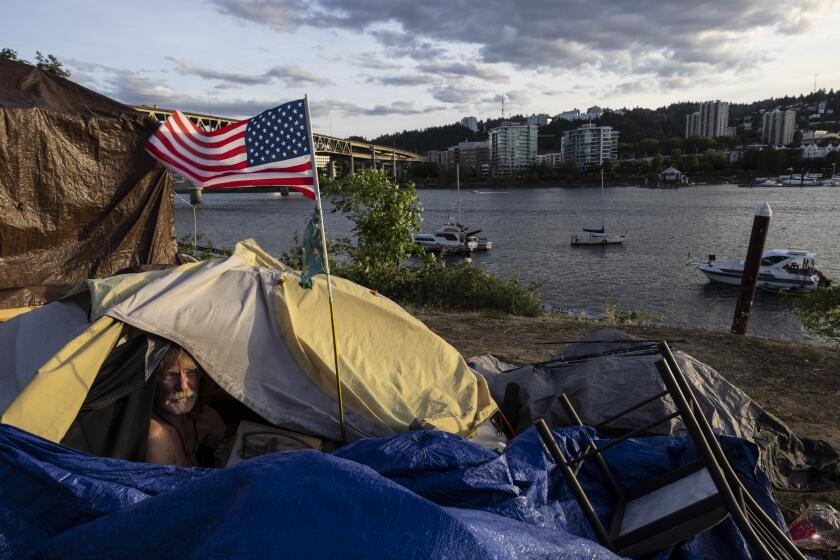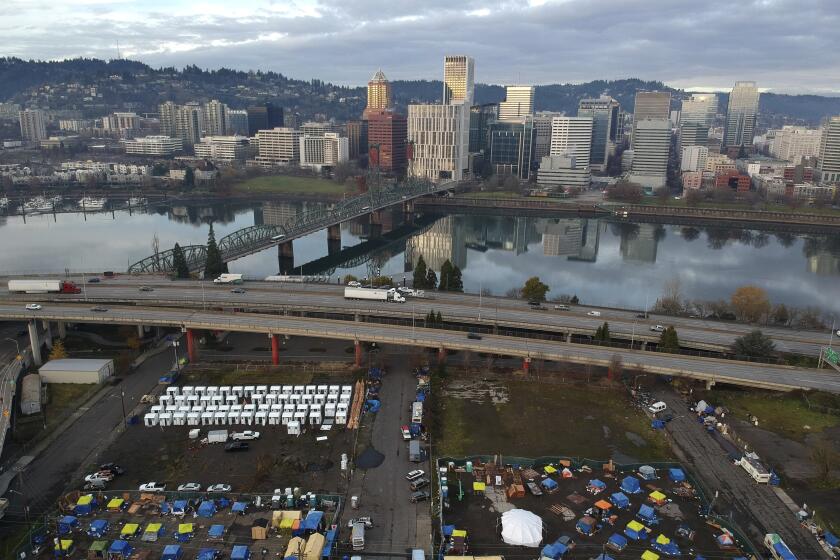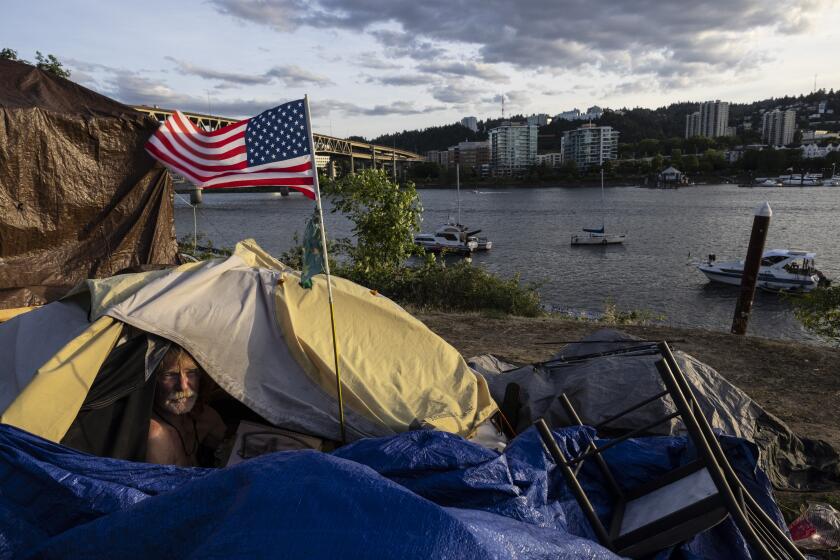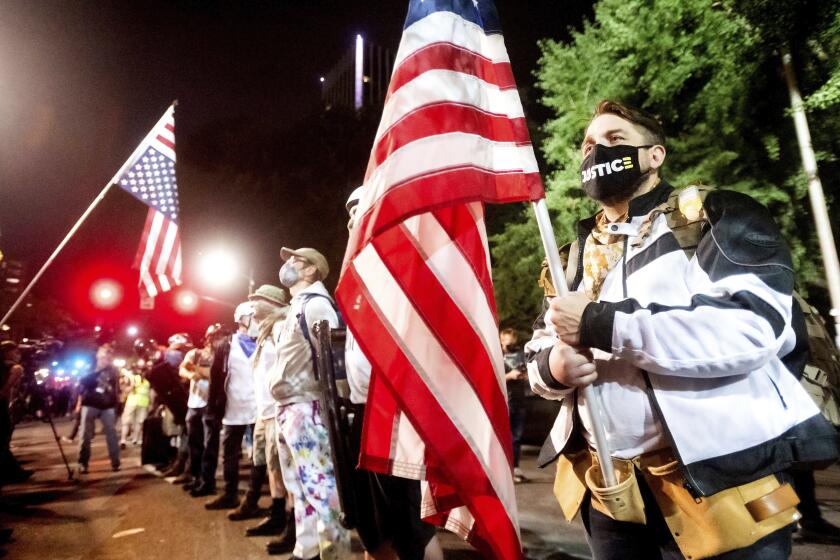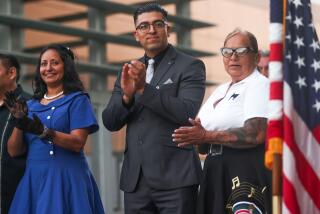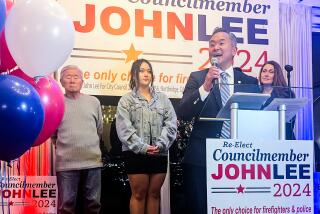19 mayoral candidates compete to lead Portland, Ore., in a race with homelessness at its heart

PORTLAND, Ore. — A lot of political changes are coming to Portland, Ore.
The open mayoral race in the state’s most populous city features 19 candidates — all vying to lead after years of growing frustration over homeless encampments. Among them: three City Council members, including one ensnared in a driving record scandal; a stripper; and a trucking company CEO vowing to end unsheltered homelessness in 12 months.
The race was thrown open when Mayor Ted Wheeler decided against seeking reelection after holding the city’s top post since 2017. Wheeler rose to national prominence in 2020 as nightly protests erupted on Portland streets and around the country in response to the the police killing of George Floyd.
Whoever wins the mayoral seat will oversee a completely new system of government. Portland is expanding its City Council from five to 12 members, who will be elected by voters in individual districts rather than citywide, and adding a city manager position. And all the candidates — including the nearly 100 running for the new council seats — will be elected by ranked-choice voting for the first time.
Changing Portland’s charter had been on the ballot before, but failed until voters approved the overhaul in 2022. The most recent charter review kicked off amid the 2020 protests and a nationwide reckoning with racism that prompted conversations about making government more accountable and equitable.
Portland, Ore., long a famously progressive city, faces a crisis of confidence as it grapples with homelessness and crime. Residents can’t agree on solutions.
Opening the door for more diversity
Numerous candidates of color are now running for the new council seats and mayor in the majority-white city. But it’s still unclear how voters, and those elected, will navigate the new system and its logistics.
“I don’t think that anyone has a really clear sense of exactly how things are going to work immediately after this election,” said Chris Shortell, associate professor of political science at Portland State University.
There are a few constants in this year’s campaign, however — concerns over homelessness and public drug use. Surveys conducted over the past few years have shown that Portland residents view homelessness as a top issue, said John Horvick, senior vice president of polling firm DHM Research.
“The key issues remain the key issues,” said Horvick. “Those continue to be the organizing principles of Portland politics and will certainly be through this election and beyond.”
City council members Rene Gonzalez and Carmen Rubio have led in fundraising among the mayoral candidates, along with Keith Wilson, whose freight company includes electric trucks. They’ve presented different visions for reducing homelessness in a metro area where a January 2023 count found nearly 4,000 people living unsheltered.
Voters in Portland, Ore., driven in part by frustration with surging homelessness, have approved a measure that will completely reinvent City Hall.
Differing approaches to homelessness
Gonzalez, who is endorsed by law enforcement groups, pressured Multnomah County, home to Portland, to pause giving tents and tarps to homeless people. He has pushed for stricter enforcement of anti-camping rules.
Rubio has called for more outreach workers and improved coordination between the players in the homelessness response system, such as shelters and social service groups.
Wilson, who founded a nonprofit working to increase homeless shelter capacity, has pledged to end unsheltered homelessness in his first year on the job. His campaign website says he’ll accomplish this ambitious goal in part by increasing the number of nighttime walk-in emergency shelters in existing facilities such as churches and community centers.
The three leading fundraisers are followed by City Council member Mingus Mapps, as well as Liv Østhus, a writer, musician and stripper whose stage name is Viva Las Vegas.
Mapps, whose campaign has struggled to gain momentum, is hoping to become Portland’s first Black mayor. If either he, or Rubio or Gonzalez — who have Latino heritage — are elected, it would mark the first time a person of color has led the city.
For much of the year, Rubio and Gonzalez were viewed as front-runners. But recent revelations about Rubio’s driving record — as well as Gonzalez’s, to a much lesser extent — have shaken up the race.
Until a year ago, Portland, Ore., was best known nationally for its ambrosial food scene, craft breweries and ‘Portlandia’ hipsters.
Driving violations
Rubio has received roughly 150 parking and traffic violations over the last two decades. She failed to pay many of them for months or even years and had her license suspended six times. She lost some endorsements following the news, which was first reported by the Oregonian/OregonLive.
“The best I can do at this point is to say again that I’m very sorry, and that earning Portlanders’ trust back is an ongoing commitment I take very seriously,” Rubio said in an emailed statement.
Gonzalez also had his license suspended twice over 20 years ago and racked up seven speeding tickets between 1998 and 2013, including one that was dismissed, as first reported by Willamette Week.
“As a younger man, I sometimes drove too fast,” Gonzalez said in an emailed statement. “But as I’ve gotten older, I’ve become more responsible and it is reflected in my record.”
The news about driving records has created an opportunity for Wilson, who has never held elected office, said Shortell, the Portland State professor.
Portland, Ore., where more than 72% of the population is white, has been transformed into a national center of the movement for racial justice.
“What looked like it was going to be a straightforward race has shifted in recent weeks into a little bit more open-ended race,” he said. “That has, when combined with the ranked-choice voting system, opened some space for Keith Wilson.”
Under ranked-choice voting, voters rank their picks in order of preference on the ballot. If a candidate is the first choice of more than 50% of voters in the first round of counting, that candidate wins.
Otherwise, the count continues to a second round. The candidate with the fewest votes is eliminated, and voters who chose that candidate as their top pick have their votes redistributed to their next choice. The process continues with the candidate with the fewest votes getting eliminated until someone emerges with a majority of votes.
If Rubio and Gonzalez end up splitting voters, Wilson could be a second choice for enough voters to potentially advance, Shortell said.
The new voting system, new form of government, and sheer number of people running for office represent a lot of moving parts for both candidates and voters, and it may take multiple election cycles for City Hall and residents to get a clear sense of how things work, Shortell said.
“Right now it’s a new system, and everyone is trying to figure out what it means,” he said. “And that’s the nature of change.”
Rush writes for the Associated Press.
More to Read
Sign up for Essential California
The most important California stories and recommendations in your inbox every morning.
You may occasionally receive promotional content from the Los Angeles Times.
